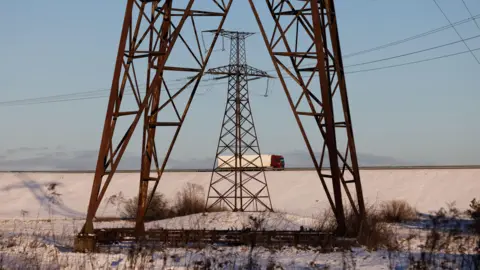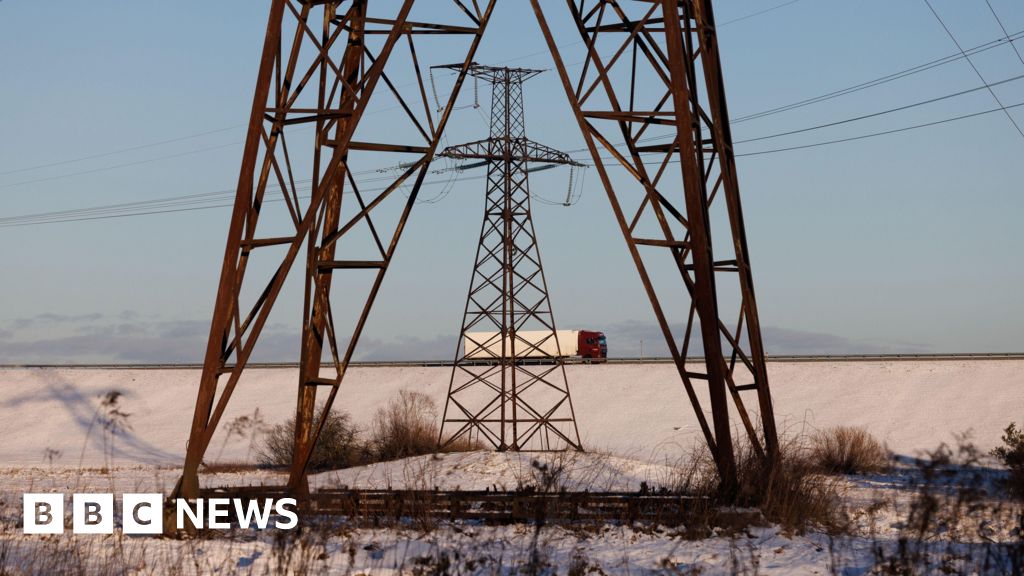 Getty Images
Getty ImagesMore than three decades after leaving the Soviet Union, Estonia, Latvia, and Lithuania have begun to unplug from Russia’s electricity grid and join the EU’s network.
The two-day process began on Saturday morning, with residents told to charge their devices, stock up on food and water, and prepare as if severe weather is forecast.
Many have been told not to use lifts – while in some areas traffic lights will be turned off.
A giant, specially-made clock, will count down the final seconds before the transition at a landmark ceremony in Lithuania’s capital on Sunday, attended by EU chief Ursula von der Leyen.
The three nations will then officially transition away from the grid that has connected them to Russia since the years after World War Two.
‘On high alert’
The so-called Brell power grid – which stands for Belarus, Russia, Estonia, Latvia, Lithuania – is controlled almost entirely by Moscow and has long been seen as a vulnerability for the former Soviet republics, which are now Nato members.
Though none of them have purchased electricity from Russia since 2022, their connection to the Brell grid left them dependent on Moscow for energy flow.
After disconnecting on Saturday morning, the three countries will carry out frequency tests before integrating into the European grid via Poland on Sunday.
“We are now removing Russia’s ability to use the electricity system as a tool of geopolitical blackmail,” Lithuania’s Energy Minister Zygimantas Vaiciunas told AFP news agency.
“It’s the culmination of efforts over more than 10 years or 20 years, to reduce that energy dependence,” Prof David Smith of the Baltic Research Unit at the University of Glasgow told the BBC.
“When the Baltic States joined the EU and Nato, everybody talked about them being an energy island that was still dependent on that joint electricity network with Belarus and Russia,” said Smith. “That’s been completely broken now.”
Tensions between the Baltic States and Russia, which share a combined 543 mile-long (874km) border, have soared since Russia’s full-scale invasion of Ukraine in February 2022.
Since then, a spate of suspected sabotage incidents involving electricity cables and pipelines in the Baltic Sea have prompted fears that Moscow could retaliate against the shift towards EU energy.
 Getty Images
Getty ImagesIn the past 18 months, at least 11 cables running under the Baltic Sea have been damaged. In a recent case, a ship from Russia’s “shadow fleet” of oil tankers was accused of damaging Estonia’s main power link in the Gulf of Finland. The Kremlin declined to comment.
Nato has not accused Russia, but has responded by launching a new patrol mission of the region named Baltic Sentry.
“We cannot rule out some kind of provocation. That is why Latvian and foreign security authorities are on high alert,” Latvian President Edgars Rinkēvičs said on Wednesday.
“Clearly there are risks, we understand that very well,” Latvian Prime Minister Evika Silina echoed. “But the risks are identified and there is a contingency plan.”
‘Cyber-attacks’
A spokesperson from the Nato Energy Security Centre of Excellence told the BBC that in recent months, frequent emergency operation tests have been carried out to help prepare for potential targeted attacks on the energy system.
The head of Estonia’s Cybersecurity Centre, Gert Auvaart, told the BBC in a statement that Russia “may attempt to exploit this period to create uncertainty”, but said that due to international co-operation, Estonia was “well-prepared even for worst-case scenarios”.
He added that cyber-attacks against the country had surged following Russia’s invasion of Ukraine, and ranged from “hacktivist-driven DDoS attacks [Distributed Denial-Of-Service] to more sophisticated, targeted operations against government agencies and businesses”.
The Baltic states will also be on watch for disinformation campaigns related to the transition.
Shortly after they notified Russia of their decision to withdraw from Brell in August 2024, campaigns emerged on social media falsely warning of supply failures and soaring prices if the countries were to leave the joint power grid.

